Authentic Audience In PBL
Authentic Audience In PBL: Project-Based Learning (PBL) is an effective educational approach that engages students in real-world, authentic tasks and challenges. Incorporating an authentic audience into PBL can significantly enhance critical thinking skills by providing students with a meaningful context and purpose for their work. Here are some strategies for using an authentic audience to unlock critical thinking in PBL:
Identify a Real-World Problem or Challenge:
- Choose a problem or challenge that is relevant and meaningful to the community or a specific audience.
- This real-world connection helps students see the practical applications of their learning and encourages them to think critically about solutions.
Define the Authentic Audience:
- Clearly identify the target audience for the project. This could be experts in the field, community members, professionals, or even peers.
- Knowing their audience helps students tailor their work to meet specific expectations and requirements.
Engage Experts and Professionals:
- Invite experts or professionals related to the project topic to provide guidance, feedback, or even participate as part of the audience.
- This exposure to real-world expertise challenges students to think critically and ensures their work meets industry or professional standards.
Create Authentic Products:
- Design projects that result in tangible, authentic products or solutions that can be shared with the intended audience.
- Whether it’s a presentation, prototype, report, or any other deliverable, having a real audience in mind motivates students to think critically about the quality and impact of their work.
Conduct Peer Reviews:
- Incorporate peer review processes where students evaluate each other’s work based on specific criteria.
- This fosters critical thinking as students analyze, critique, and provide constructive feedback, mirroring the expectations of a real audience.
Facilitate Presentation Opportunities:
- Arrange opportunities for students to present their projects to an authentic audience, such as community members, professionals, or other stakeholders.
- Public speaking and defending their ideas in front of a real audience promote critical thinking and communication skills.
Encourage Reflection:
- Implement regular reflection activities where students assess their progress, challenges, and learning experiences.
- Reflection promotes metacognition and helps students think critically about their problem-solving processes and the decisions they make throughout the project.
Emphasize Real-World Impact:
- Connect the project outcomes to potential real-world impact, emphasizing how their work can make a difference or contribute to positive change.
- Understanding the broader implications of their projects encourages students to think critically about the significance of their contributions.
By incorporating an authentic audience into PBL, educators can create a dynamic learning environment that not only enhances critical thinking but also prepares students for the complexities of real-world problem-solving.
